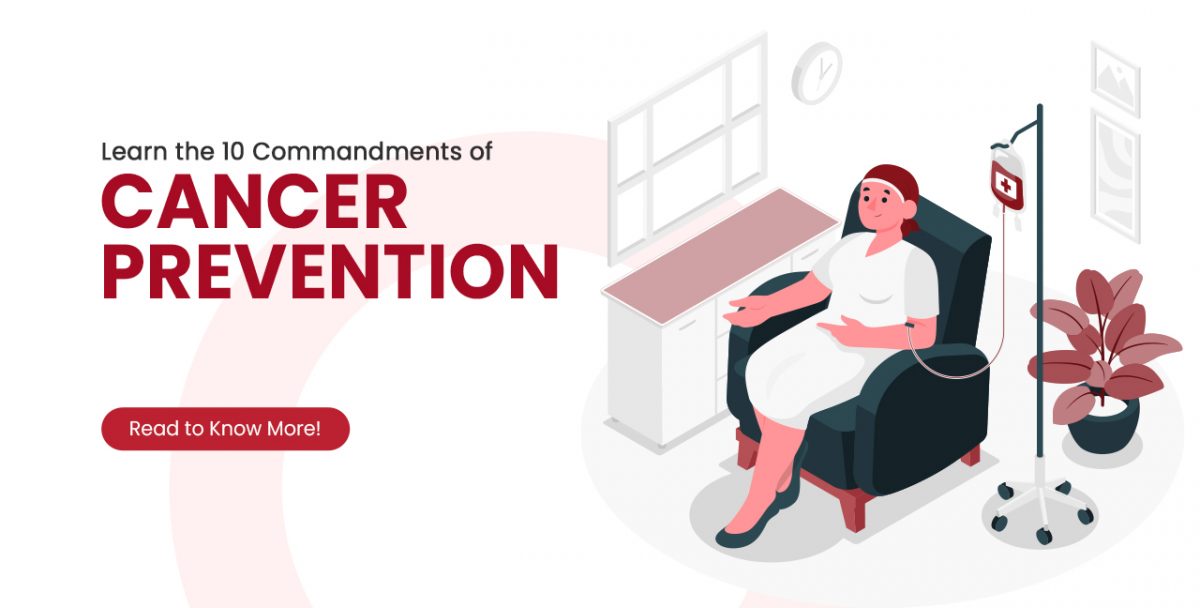
Cancer is a broad term for a wide set of diseases that occur when normal cells transform into malignant cells that reproduce and spread. Cancer is a fatal condition and the second leading cause of death across the world. The battle against cancer has taken a positive turn in the last few years thanks to the advancements in medical technologies and various early detection mechanisms. Simultaneously, medical experts are finding independent risk factors associated with cancer to help patients avoid contracting the disease.
Prevention of Cancer
- Quit smoking to reduce your risk of various cancers, not just lung cancer
- Choose a healthy diet that includes fruits, vegetables, whole grains, and lean proteins to contribute to the prevention of cancer.
- Exercising most days of the week is linked to a lower risk of cancer.
How to Reduce the Risk of Cancer
- Avoid excessive sun exposure by staying in the shade, wearing protective clothing, or applying sunscreen to lower the risk of cancer.
- Maintain a healthy weight through a combination of a balanced diet and regular exercise.
- Stopping the consumption of alcohol may decrease the risk of various cancers.
Cancer Prevention Strategies
- Schedule your cancer screening test as a proactive measure based on your risk factors.
- Inquire with your doctor about immunizations to prevent viruses that increase the risk of cancer, such as Hepatitis B and Human papillomavirus (HPV).
- Whether you smoke or not, emphasise the importance of preventing cancer by following these lifestyle choices.
10 Commandments of Cancer Prevention
- Avoid tobacco: Avoid all tobacco products, including secondhand smoke.
- Eat healthy: Reduce your intake of saturated fat and red meat, as they may increase your risk of colon cancer and a more aggressive form of prostate cancer. Increase your intake of fruit, vegetables, and whole grains.
- Exercise regularly: Physical activity has also been associated with a lower incidence of colon cancer. Exercise appears to lower a woman’s risk of breast and perhaps reproductive cancer. Even if you don’t lose weight, exercise can help you stay healthy.
- Stay Balanced: Keep your body lean. Obesity raises the risk of several types of cancer. If you want to lose weight, eat fewer calories and burn more through activity.
- Avoid Alcohol Consumption: Alcohol consumption raises the risk of cancers in the mouth, larynx (voice box), oesophagus (food pipe), liver, and colon, as well as breast cancer in women.
- Avoid unnecessary radiation exposure: Protect yourself against the sun’s UV radiation, which increases the risk of melanomas and other skin cancers. Don’t be concerned about electromagnetic radiation from high-voltage power lines or radiofrequency radiation from microwaves and cell phones. They don’t cause cancer.
- Avoid environmental toxins: Asbestos fibres, benzene, aromatic amines, and polychlorinated biphenyls (PCBs) are all industrial and environmental hazards to avoid.
- Avoid infections: Protect yourself from hepatitis viruses, HIV, and the human papillomavirus. Many are spread sexually or via infected needles.
- Make a fixed time for sleep: Make good sleep a priority. Admittedly, the research between sleep and cancer is not substantial. However, poor and insufficient sleep is related to weight gain, which is a cancer risk factor.
- Get enough Vitamin D: Many doctors now recommend 800 to 1,000 IU per day, which is extremely impossible to achieve without using a supplement. Vitamin D helps to reduce the risk of prostate cancer, colon cancer, and other cancers. But do not count on other supplements.
The words “you have cancer” may be one of the most difficult things to hear. Learning that you have cancer can scare and overwhelm you. Many people feel that they have lost control over their lives. The doctors of Regency Multi Super Speciality Hospital are aware of all of your concerns. Regency Multi Super Speciality Hospital also recognises that cancer treatment should be through compassionate care and support from doctors and family members. They provide counselling, nutritional plans, and pain management in a holistic way to ease your cancer treatment journey. If you have been diagnosed with cancer, remember that Regency will be with you every step of the journey.

 Call-an-Ambulance
Call-an-Ambulance



